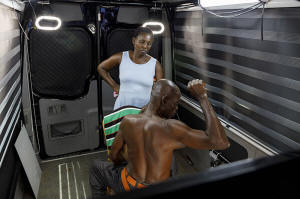New 3D technology could soon bring surgeons closer to patients in
Africa's most remote regions
[March 29, 2025]
By NAA ADORKOR CUDJOE
KOFORIDUA, Ghana (AP) — Charles Owusu Aseku has traveled across Ghana
and beyond in search of care for the large growth of tissue called a
keloid on his neck since 2002. The 46-year-old was growing increasingly
frustrated after two unsuccessful surgeries and a trip to South Africa
that ended with just a consultation.
Aseku was preparing for yet another medical trip until late February
when he joined others in the first trial of 3D telemedicine technology
in Ghana powered through computer screens in the back of a van.
Those behind the initiative, developed by Microsoft’s research team in
partnership with local doctors and researchers, say the remote
assessment will help provide medical consultations for patients awaiting
surgery or after an operation, in a region where the doctor-to-patient
ratio is among the lowest in the world.
The project builds on earlier trials in Scotland and now works as a
portable system with enhanced lighting and camera upgrades.
Once inside the van, cameras will capture a 3D model of each patient and
the image is then projected onto a large computer screen. Multiple
doctors can join the consultation session online and manipulate the 3D
model to assess the patient.
“The idea behind the van is to allow it to travel to those remote
villages that don’t have specialized care ... to perform a pre or
post-surgical consult,” said Spencer Fowers, principal software
developer and 3D-telemedicine project lead at Microsoft Research.
The initiative also gives patients the opportunity to have multiple
opinions. Aseku’s session had doctors from Rwanda, Scotland and Brazil,
an experience that he said gave him hope.
"I see a lot of doctors here and I am very happy because experience will
come from each of them and maybe they will find a solution to my
problem,” the 46-year-old said.
Researchers hope the trial at the Koforidua Regional Hospital, in
Ghana’s eastern region, is the start of a wider project that could
expand the service and explore new use cases.

Recent years have seen growing use of telemedicine, especially since the
COVID-19 pandemic. Experts say such digital tools can benefit patients
in Africa the most because there are so few specialist doctors for the
continent's 1.4 billion people.
[to top of second column]
|

George Opoku, 68, accompanied by his daughter, attends the first
live trial of 3D telemedicine technology by the Microsoft Research
team at Koforidua Hospital in Ghana, Tuesday, Feb. 25, 2025. (AP
Photo/Misper Apawu)
 George Opoku, 68, was referred to
the Korle-Bu Teaching Hospital in the capital Accra — nearly 100
kilometers away from the Koforidua hospital, which is much closer to
his home — where he had first gone to seek care for sarcoma, a rare
form of cancer that develops in the bones and soft tissues.
Upon hearing about the 3D telemedicine trial, his doctor decided to
register him for the process, saving him the extra expenses and
stress of long-distance travel.
“This time I had to sit in a van and to introduce myself and
condition to not only one doctor but several of them. I was able to
answer all their questions and I am hopeful that they will discuss
and cure me of my condition,” Opku said. “I feel well already and I
am hopeful."
A key challenge for the project is the lack of stable internet
access, a common problem in remote parts of Africa.
At the Korle-Bu Teaching Hospital, the technology is helping
patients in need of plastic surgery. An inadequate number of plastic
surgeons means that patients often have to consult with different
doctors during each visit.
Dr. Kwame Darko, consultant plastic surgeon at the hospital and one
of the principal investigators on the project, said that 3D
telemedicine could give patients the chance to be seen by multiple
doctors during one session.
The 3D technology could make a difference if replicated in Ghana and
elsewhere, according to Dr. Ahensan Dasebre, chief resident doctor
at the National Reconstructive Plastic Surgery and Burns Centre at
Korle-Bu, who was not part of the project.
“We are already behind in terms of how many doctors are available to
care for a certain number of the population,” he said.
“If somebody is in a remote part of town where he doesn’t have
access to these specialized services, but needs it, the referring
doctor could actually use this telemedicine thing to get access to
the best of care.”
All contents © copyright 2025 Associated Press. All rights reserved |